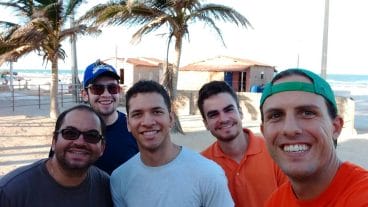 “Without giving it much thought, we had chosen the title together, “Building Bridges,” which could not have been more suitable: we couldn’t distinguish the youths of the wealthier districts from those of the poorer communities. The teams were composed of boys and girls from 10 to 18 altogether. The bigger kids took care of the smaller ones and the smaller ones enlivened the older ones. The participation of the poor communities did not imbue minimally an aspect of social assistance: all benefited from this interaction.” Renzo Megli, who had taken part right from the beginning in the organization of the Olympic games for kids, immediately laid down the foundations and success of the project, and described the preparatory activities with a passionate tone. “It seemed the winds were blowing against it. The idea of perfection and the memory of the “professional” or “semi-professional” sports fields of the previous editions deterred out spirits, blocked our minds, and saddened our thoughts. On the contrary, I was happy because of all the doors that closed on us and the slow and tiring change of direction: the only possibility that remained was to bring the Olympic games to the CEU, the Condominio Espiritual Uirapuru. We started to work on the project, determined to make the event a reality. But the conflicts remained evident; the compasses were still disoriented by old magnetic fields. Stop! We had to choose: shall we go ahead as one or stop? Would it be better to achieve something less perfect, but together, or something perfect in disunity? These will be different types of Olympic games, less professional, and perhaps less “trendy.” But perhaps it is precisely the breeze of the Spirit that is leading us to do something new, and different. We decided to go towards a common north. Even those who first were contrary have started to row in the same direction. Only then did I remember a conversation I had much earlier on with a focolarino who is older than me. He had given me this advice: “To lose an idea you must first possess it, and possibly, it must be really yours, as if it were your child, flesh of your flesh. Imagine a bottle of champagne: it must be full before you can remove its cap and let its bubbles flow.” That was how I felt, “father” to my idea, but ready to lose it. Each of us, upon “losing” our own idea, have become together, “parents” of a better idea, which has been polished along the way.
“Without giving it much thought, we had chosen the title together, “Building Bridges,” which could not have been more suitable: we couldn’t distinguish the youths of the wealthier districts from those of the poorer communities. The teams were composed of boys and girls from 10 to 18 altogether. The bigger kids took care of the smaller ones and the smaller ones enlivened the older ones. The participation of the poor communities did not imbue minimally an aspect of social assistance: all benefited from this interaction.” Renzo Megli, who had taken part right from the beginning in the organization of the Olympic games for kids, immediately laid down the foundations and success of the project, and described the preparatory activities with a passionate tone. “It seemed the winds were blowing against it. The idea of perfection and the memory of the “professional” or “semi-professional” sports fields of the previous editions deterred out spirits, blocked our minds, and saddened our thoughts. On the contrary, I was happy because of all the doors that closed on us and the slow and tiring change of direction: the only possibility that remained was to bring the Olympic games to the CEU, the Condominio Espiritual Uirapuru. We started to work on the project, determined to make the event a reality. But the conflicts remained evident; the compasses were still disoriented by old magnetic fields. Stop! We had to choose: shall we go ahead as one or stop? Would it be better to achieve something less perfect, but together, or something perfect in disunity? These will be different types of Olympic games, less professional, and perhaps less “trendy.” But perhaps it is precisely the breeze of the Spirit that is leading us to do something new, and different. We decided to go towards a common north. Even those who first were contrary have started to row in the same direction. Only then did I remember a conversation I had much earlier on with a focolarino who is older than me. He had given me this advice: “To lose an idea you must first possess it, and possibly, it must be really yours, as if it were your child, flesh of your flesh. Imagine a bottle of champagne: it must be full before you can remove its cap and let its bubbles flow.” That was how I felt, “father” to my idea, but ready to lose it. Each of us, upon “losing” our own idea, have become together, “parents” of a better idea, which has been polished along the way.  Renzo continued his story: “The CEU Director has promised space and the equipment. All the work we had performed up to then was based on this available place. But then the cancellation arrived: we could no longer use that facility. The “dynamics of losing” and of placing in God all our worries has become almost like a daily event that after a few moments of dismay we took this adversity as a clear sign of the spirit. Inviting the children of the CEU community was the most important thing, but time was flying and the enrollments proceeded slowly, leaving us with a lump in the throat: will we reach a minimum number of participants? We decided to open the enrollments also to those who cannot participate due to economic difficulties. We wanted to entrust ourselves to Providence. Many supporters popped up, and all the expenses, even the unforeseen, were covered. The smile of the numerous CEU children became the icon of our Olympics. An extraordinary joy was evident in all, animators, parents, and players. A child of one of the CEU communities said: “I found my father here.” This was a bigger boy who really had shown him love. Among the participants were also the girls of the Lar Santa Mônica community that hosts adolescent victims of domestic sexual abuse. They had become a bit surly and wanted to go home immediately. Instead they participated up to the end. We saw them leave happy. This transformation was one of the most beautiful victories of our Olympics.”
Renzo continued his story: “The CEU Director has promised space and the equipment. All the work we had performed up to then was based on this available place. But then the cancellation arrived: we could no longer use that facility. The “dynamics of losing” and of placing in God all our worries has become almost like a daily event that after a few moments of dismay we took this adversity as a clear sign of the spirit. Inviting the children of the CEU community was the most important thing, but time was flying and the enrollments proceeded slowly, leaving us with a lump in the throat: will we reach a minimum number of participants? We decided to open the enrollments also to those who cannot participate due to economic difficulties. We wanted to entrust ourselves to Providence. Many supporters popped up, and all the expenses, even the unforeseen, were covered. The smile of the numerous CEU children became the icon of our Olympics. An extraordinary joy was evident in all, animators, parents, and players. A child of one of the CEU communities said: “I found my father here.” This was a bigger boy who really had shown him love. Among the participants were also the girls of the Lar Santa Mônica community that hosts adolescent victims of domestic sexual abuse. They had become a bit surly and wanted to go home immediately. Instead they participated up to the end. We saw them leave happy. This transformation was one of the most beautiful victories of our Olympics.”
Put love into practice
Put love into practice




0 Comments